Login
Registration enables users to use special features of this website, such as past
order histories, retained contact details for faster checkout, review submissions, and special promotions.
order histories, retained contact details for faster checkout, review submissions, and special promotions.
Forgot password?
Registration enables users to use special features of this website, such as past
order histories, retained contact details for faster checkout, review submissions, and special promotions.
order histories, retained contact details for faster checkout, review submissions, and special promotions.
Quick Order
Products
Antibodies
ELISA and Assay Kits
Research Areas
Infectious Disease
Resources
Purchasing
Reference Material
Contact Us
Location
Corporate Headquarters
Vector Laboratories, Inc.
6737 Mowry Ave
Newark, CA 94560
United States
Telephone Numbers
Customer Service: (800) 227-6666 / (650) 697-3600
Contact Us
Additional Contact Details
Login
Registration enables users to use special features of this website, such as past
order histories, retained contact details for faster checkout, review submissions, and special promotions.
order histories, retained contact details for faster checkout, review submissions, and special promotions.
Forgot password?
Registration enables users to use special features of this website, such as past
order histories, retained contact details for faster checkout, review submissions, and special promotions.
order histories, retained contact details for faster checkout, review submissions, and special promotions.
Quick Order
PathPlusTM HP / Haptoglobin Antibodies
HP (Haptoglobin) is a protein produced by hepatic cells that binds free plasma hemoglobin to make it accessible to degradative enzymes. It serves a protective function in the kidneys by preventing the loss of iron and protecting them from hemoglobin-induced damage. It has also been shown to have antimicrobial activity against bacteria. HP mutations and regulatory defects cause ahaptoglobinemia and hypohaptoglobinemia. Inherited HP polymorphisms are also associated with diabetic nephropathy, the incidence of coronary artery disease in type 1 diabetes, inflammatory disease behavior, Crohn's disease, primary sclerosing cholangitis, and susceptibility to idiopathic Parkinson's disease. In immunohistochemistry, HP has cytoplasmic and secretory positivity in the liver, and is also found in the kidneys, skin, lung and adipose tissue.
References: The UniProt Consortium. Nucleic Acids Res. 47: D506-515 (2019); Nucleic Acids Res. 2016 Jan 4;44(D1):D733-45, PMID:26553804; J Crohns Colitis. 2008 Sep;2(3):214-8, PMID: 21172213,J Diabetes Complications. 2008 Nov-Dec;22(6):384-8, PMID: 18413152; Parkinsonism Relat Disord. 2015 Sep;21(9):1087-92, PMID: 26228081;
5 PathPlusTM Antibodies
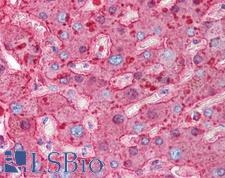
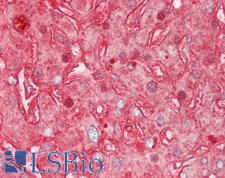
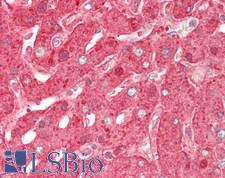
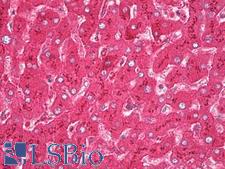
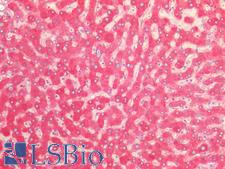
☰ Filters
Products
Antibodies
(5)
Type
Primary
(5)
Target
HP / Haptoglobin
(5)
Reactivity
Human
(5)
Mouse
(2)
Rat
(1)
Application
IHC
(5)
IHC-P
(5)
WB
(5)
Flo
(2)
ELISA
(3)
ID
(1)
IP
(1)
Host
rabbit
(3)
mouse
(1)
goat
(1)
Product Group
PathPlus Cancer
(5)
Isotype
IgG
(2)
IgG1
(1)
Clonality
monoclonal mc
(1)
polyclonal pc
(4)
Format
Unconjugated
(5)
Epitope
aa19-406
(1)
aa295-322
(1)
Publications
No
(4)
Yes
(1)

Cancer
HP / Haptoglobin Rabbit anti-Human Polyclonal Antibody
Human
ELISA, IHC, IHC-P, WB
Unconjugated
50 µg/$775

Cancer
HP / Haptoglobin Goat anti-Human Polyclonal Antibody
Human
ELISA, Flo, ID, IHC, IHC-P, IP, WB
Unconjugated
0.5 mg/$460

Cancer
HP / Haptoglobin Rabbit anti-Human Polyclonal (aa295-322) Antibody
Mouse, Human
Flo, IHC, IHC-P, WB
Unconjugated
200 µl/$375

Cancer
HP / Haptoglobin Mouse anti-Human Monoclonal (aa19-406) Antibody
Human
ELISA, IHC, IHC-P, WB
Unconjugated
50 µl/$375

Cancer
HP / Haptoglobin Rabbit anti-Human Polyclonal Antibody
Mouse, Rat, Human
IHC, IHC-P, WB
Unconjugated
50 µl/$375
Viewing 1-5
of 5
product results











